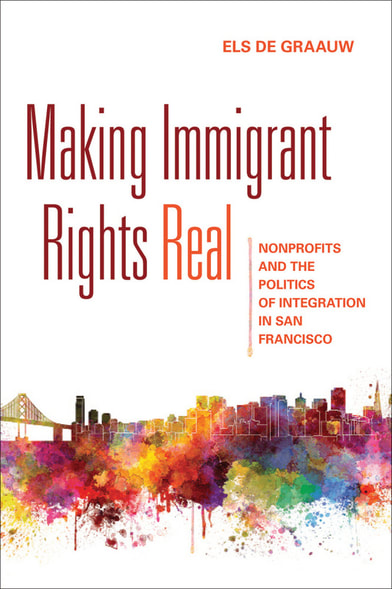2017 Best Book Award
|
|
Contents
|
Introduction: The Local Politics of Immigrant Integration
1. Nonprofit Organizations as Immigrant Rights Advocates 2. Immigrants and Politics in San Francisco 3. Providing Language Access through Nonprofit-Government Collaborations 4. Raising Minimum Wages through Nonprofit-Union Collaborations 5. Strategic Framing and Municipal ID Cards Conclusion: Making Immigrant Rights Real |
|
Back Cover Praise
|
"In Making Immigrant Rights Real, Els de Graauw engages with three fascinating cases of immigrant nonprofits' involvement in city politics and program implementation. The author brings to bear evidence from a well-executed, original survey of immigrant nonprofits, as well as incisive quotes from in-depth interviews with nonprofits' leaders and staff, elected officials, and public administrators. The tripartite model de Graauw devises to show how immigrant nonprofits make gains for their clients in local politics is insightful and well supported by the evidence presented." --Paul G. Lewis, Arizona State University, author of Shaping Suburbia: How Political Institutions Organize Urban Development
"Immigrant rights become real when they're actually implemented and enforced. Els de Graauw’s important book reveals how San Francisco’s immigrant-serving nonprofits quietly, mostly invisibly, but very effectively overcame legal restrictions and limited resources to become powerful political actors advocating for immigrant rights, mediating between local government and the immigrant community, and converting policy on paper into policy in practice. Highly recommended." --Richard DeLeon, author of Left Coast City "Els de Graauw tells us something new about the role of nonprofits at the local level in advancing immigrant rights. She shows that nonprofits achieve success by effectively using three strategies: administrative advocacy, collaboration across sectors and with other types of nonprofit organizations, and strategic issue framing." --Mara Sidney, author of Unfair Housing "Taking stock of the important role that local nonprofits play in the lives of immigrants is required for a full understanding of immigrant integration in America. Els de Graauw's deftly crafted account is required reading for anyone who hopes to cut through the heated political rhetoric of the immigration debate to understand how the politics of immigration actually happens." --Tomás R. Jiménez, author of Replenished Ethnicity |
|
Reviews
|
Social Service Review 91(1) (March 2017)
Journal of Sociology and Social Welfare 44(1) (March 2017) Contemporary Sociology 46(5) (August 2017) Perspectives on Politics 16(2) (June 2018) International Journal of Urban and Regional Research 42(4) (July 2018) Industrial and Labor Relations Review 71(4) (July 2018) Migration Studies (online) (April 2019) Ethics and Social Welfare 13(2) (May 2019) International Migration Review 54(1) (March 2020) |

